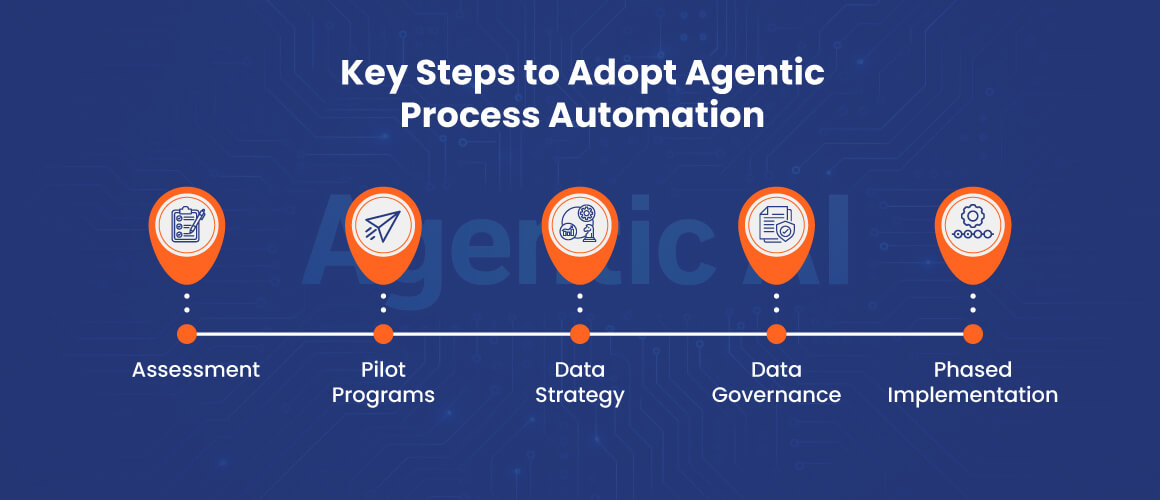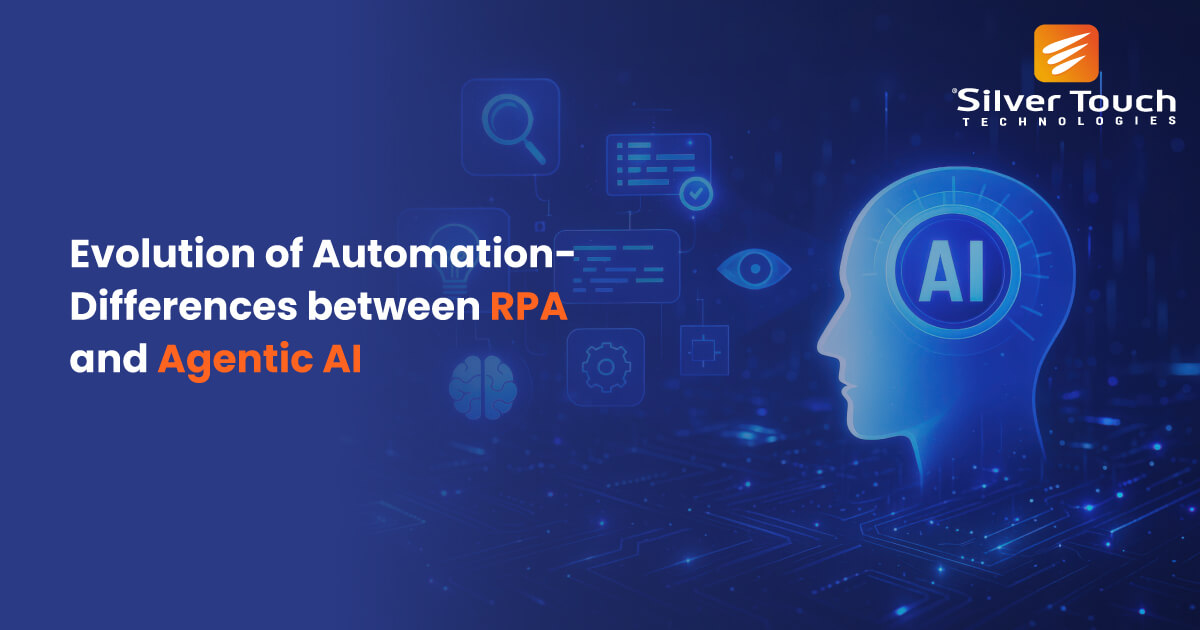Higher efficiency and innovative approaches have become essential for the growth of modern enterprises. Robotic Process Automation (RPA) has remained a useful technology for companies to achieve this goal by handling repetitive, rule-based tasks. However, in this more complex and challenging business scenario, traditional RPA is not sufficient to drive growth.
Limitations of RPA include its inability to deal with unstructured data or rapidly changing conditions. Here, agentic automation comes into the picture. It offers the next-generation automation, enabling companies to leverage the advantage of AI in making decisions and handling complex tasks.
This blog discusses the increasing importance of agentic AI processes in enterprises, highlighting real-world use cases and comparing them with RPA. Let’s start with understanding the Agentic AI concept and its scope in modern companies.
Rise of Agentic AI in Modern Enterprises
Robotic process automation has been used in industrial automation for years, handling repetitive tasks. However, the increasing complexity of processes and unstructured data pose difficulties for modern industries. Agentic automation addresses these issues effectively. It brings a dynamic solution based on AI agents that perform autonomously.
Companies have embraced agentic AI processes for streamlining workflows and eliminating the need for human intervention. As per the research report of Markets and Markets, the global intelligent process automation market is expected to reach USD 30 billion by 2030. Agentic AI can interpret tasks and adapt to changing conditions while making real-time decisions.
Agentic AI consists of core AI technologies, including machine learning, NLP (Natural Language Processing), and computer vision. It can interpret complex data and make autonomous decisions effectively. This AI-powered automation is capable of handling dynamic and complex tasks, unlike RPA’s simple and repetitive actions.
Let’s go through the differences between RPA vs agentic automation.
RPA vs Agentic AI- How Both Are Different
Robotic process automation and agentic AI work differently. It is interesting to compare them from different aspects.
Scope
RPA works wonders while handling rule-based, repetitive tasks. It can perform script-driven actions.
An agentic AI system, on the other hand, can handle complex processes using its autonomous and AI-driven decision-making capabilities.
Complexity
Robotic process automation is ideal for repetitive, high-volume, and structured tasks. It requires clear and predictable steps, like data entry.
Agentic automation is useful for handling complex and dynamic tasks. It can also interpret unstructured data through its problem-solving capabilities.
Decision-Making
When it comes to RPA, the decision-making is limited to pre-defined rules, as the software bot cannot deviate from its logic.
An Agentic process automation has autonomous decision-making capability based on learned patterns. It can also make choices based on its learning.
Scalability
RPA has limited scalability due to its rule-based nature. In other words, it is necessary to update the bot’s script in case of any change in the process.
Agentic automation is highly adaptable and flexible. It has a learning-based approach to scale across different but related tasks.
Error Handling
Even a slight deviation from its script can lead to the failure of an RPA bot. It requires an update in the case of any modification to the system.
Agentic automation is highly resilient and has a characteristic of self-correction. It can troubleshoot minor issues and even suggest a resolution.
Integration
RPA integration is possible at the API or UI level. In other words, RPA bots can interact with applications by clicking buttons and filling fields.
Agentic AI involves a deeper cognitive integration. It means that AI agents understand the context within the applications for more strategic automation.
Here is a quick table on the difference between RPA vs Agentic AI.
| Characteristics | Robotic Process Automation (RPA) | Agentic Automation |
| Scope | Rule-based task handling, script-driven | AI-driven, autonomous task handling |
| Complexity | Repetitive, high-volume, structured tasks | Complex, unstructured, and dynamic tasks |
| Decision-Making | Based on pre-defined rules | Based on learned patterns |
| Scalability | Limited | Highly adaptable |
| Error Handling | Fails on deviation from preset rules | Self-correcting and resilient |
| Integration | API and UI-level interaction | Deeper and cognitive integration with apps |
Real-World Use Cases for Agentic Automation
Agentic or intelligent automation is beneficial for core industry sectors. Here are some real-world use cases of agentic process automation-
Finance and Accounting
Intelligent automation is useful for enhancing security and data analysis in the financial sector. AI agents can perform fraud detection by identifying subtle anomalies in transactions in real-time. Moreover, dynamic financial analysis is possible as these agents monitor market data continuously and accurately.
Customer Services
Agentic automation processes bring revolutionary changes in customer support and services. These agents can offer highly personalized support to customers based on their shopping history and sentiment. AI agents can also resolve complex queries by accessing multiple data sources.
Healthcare
Agentic automation can enable efficient healthcare delivery as agents can handle patient journey orchestration by coordinating appointments. These agents are useful for improving communication across different departments and creating personalized treatment plans as per the patient’s medical history.
Supply Chain
The logistics and supply chain management sector can get the advantage of agentic automation in dynamic inventory management. These agents can predict demand fluctuations and assist companies in optimizing stock levels and even shipping routes.
Simply put, agentic automation can increase efficiency by automating complex processes and reducing the chances of human errors. It is useful for enhancing customer experience through personalized interactions.
How to Adopt Agentic Process Automation

Agentic process automation can address the limitations of robotic process automation effectively. Companies can get the benefits of adaptability and resilience for their dynamic processes using AI agents. Furthermore, these agents go beyond task execution by offering strategic and predictive insights.
Let’s go through the key steps of adopting an agentic AI process successfully-
Assessment
You can identify and prioritize complex, dynamic processes for agentic automation.
Pilot Programs
Start with small, controlled pilot projects utilizing technology, and measure their impact.
Data Strategy
Make a plan to acquire, manage, and migrate high-quality data for training AI agents.
Data Governance
Implement clear frameworks for data governance, including accountability and transparency.
Phased Implementation
Roll out successful pilots gradually, with continuous monitoring and performance optimization.
It is better to consult a reputed agentic process automation company for end-to-end, effective implementation of AI agents.
Role of Silver Touch in Implementing Agentic Automation
Silver Touch Technologies is your trusted partner for ensuring a seamless and strategic transition from traditional to intelligent automation. As a specialist in industrial automation with a proven track record in digital transformation, we can address complex processes successfully. Our in-house team of AI professionals is expert in implementing next-gen automation in your company.
We offer a 360-degree, customized solution for your unique goals and complex business requirements. As we deliver strategic value and measurable outcomes in an agentic AI process, you can focus on other core activities to stay ahead of the curve. We assist you in navigating the complexities of the digital era and position your company as a leader in intelligent automation.
Concluding Lines
Agentic automation goes beyond RPA as AI-powered agents can analyze the data more effectively to make autonomous decisions. Core industry sectors like healthcare, manufacturing, and supply chain can enable their workforce to focus on strategic, high-value activities. Agentic process automation offers the solution to address complexities and stay ahead in the competition.
FAQs
What is the key advantage of Agentic AI over traditional RPA?
Agentic AI handles complex, dynamic tasks using autonomous, AI-driven decision-making—whereas RPA is limited to rule-based, repetitive tasks.
Can Agentic AI adapt to changes more effectively than RPA?
Agentic AI is highly adaptable and learns over time, while RPA has limited scalability and must be manually updated when processes change.
How does error handling differ between RPA and Agentic AI?
RPA bots fail when the process deviates from predefined rules, but Agentic AI is resilient—it can self‑correct and suggest fixes when errors occur.
In what ways does Agentic AI integrate more deeply than RPA?
While RPA interacts at API or UI levels, Agentic AI features deeper, cognitive integration—it understands context within applications for more strategic automation.
Which industries benefit most from Agentic Process Automation?
Industries like finance, customer service, healthcare, and supply chain benefit significantly—Agentic AI supports real-time fraud detection, personalized support, patient coordination, and predictive inventory management.
